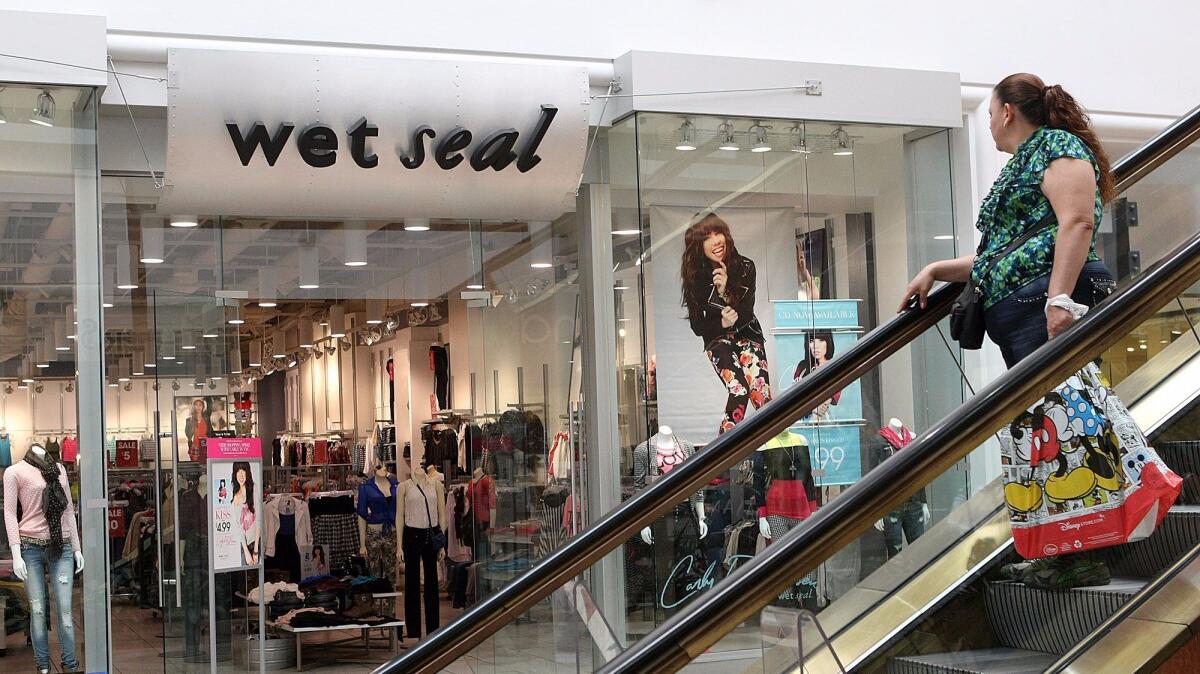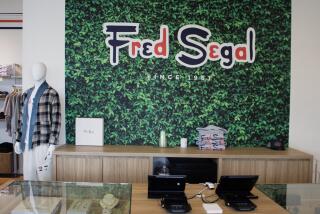Shopping habits are changing, and teen-oriented retailers like Wet Seal are among the casualties

Orange County’s Wet Seal Inc. has apparently become the latest retailer to close its doors for good in a spate of mall-shop shutdowns.
The teen-oriented retailer filed a notice with the state on Jan. 20 that it was firing 148 employees in Irvine, where it is headquartered, in what it described as a “permanent” closure. In a Jan. 20 letter, vice president and general counsel Michelle Stocke told Irvine employees that Wet Seal would close all locations and lay off its entire staff after the “company was unable to obtain the necessary capital or identify a strategic partner, and was recently informed that it will receive no further financing for its operations,” according to the Wall Street Journal.
Launched in 1962 in Newport Beach as Lorne’s, after founder Lorne Huycke, the California-themed apparel brand soon changed its name when Huycke’s wife saw a woman modeling a black bathing suit that she thought resembled “a wet seal.”
It expanded across the country in the 1980s and 1990s, offering young women a casual, sun-kissed aesthetic. As it grew, the privately held firm rolled out the unisex teen clothier retailer Limbo Lounge and later acquired 200 Contempo Casual stores from Neiman Marcus Group.
But in recent years, sales lagged and interest waned. Its reputation suffered after a racial bias suit alleged the company replaced black employees with white ones. (Wet Seal paid a $7.5 million settlement in 2013.)
After two years of losses amounted to more than $150 million, Wet Seal in 2015 closed more than 330 stores, laid off around 3,700 employees and filed for Chapter 11 bankruptcy protection.
Versa Capital Management, a private equity firm, acquired the retailer that year. Versa Capital declined to comment; Wet Seal did not immediately respond.
According to its website, Wet Seal operates 171 stores in 42 states and employs more than 3,000 people.
Wet Seal’s decline can be traced to a loss of identity, according to retail experts.
Wet Seal is not the only teen-targeted fashion firm to have suffered in recent years. Once-trendy retailers such as American Apparel and the Limited have struggled in part because of changing buying habits that prioritize steep deals and of-the-moment looks ahead of brand loyalty.
After its second bankruptcy protection filing, American Apparel was sold this month to Canadian firm Gildan Activewear and it began laying off 2,400 workers in Southern California and moving to close all of its stores. The Limited women’s apparel chain is closing 250 stores this month and laying off 4,000 employees.
But their woes came as chains such as H&M and Forever21 have flourished.
Industry experts pinpoint a few factors. Some say that for retail stores to thrive in today’s market, they must cater to a young clientele that has grown increasingly impatient roaming malls and seeks instant gratification.
As mall traffic has decreased in the last decade, some shoppers have turned to the Internet — making online and mobile shopping vital. But when customers do visit stores, they want to go where they can buy an entire outfit in one spot, according to Britt Beemer, chairman and founder of America’s Research Group.
That’s easier on the pocketbook at places like H&M and Forever 21, which carry a wide array of styles at discount prices.
SIGN UP for the free California Inc. business newsletter »
Jane Hali, chief executive at Jane Hali & Associates, an investment research firm, said today’s consumers, particularly young ones, value nothing more than a deal.
“This generation was raised seeing their parents lose their home and they went through the second-biggest recession in the country,” she said.
Peter Lynch, a partner at A&G Realty Partners, says today’s young shoppers are less loyal to brands than previous generations, which is why companies need to communicate their identity clearly.
“Unless you’re able to get an emotional connection with the customers, it’s going to be very hard to compete in apparel in today’s environment,” Lynch said.
ALSO
Californians compete for a rare prize: a blue-collar union job paying up to $200,000
Two men charged in alleged Ponzi scheme for ‘Hamilton’ tickets
California gets closer to requiring cancer warning label on Roundup weed killer
Start 2017 with a financial cleanse
UPDATES:
2:55 p.m.: This article was updated to provide additional context about Wet Seal’s origin.
This article was originally published at 11:30 a.m.
More to Read
Inside the business of entertainment
The Wide Shot brings you news, analysis and insights on everything from streaming wars to production — and what it all means for the future.
You may occasionally receive promotional content from the Los Angeles Times.











